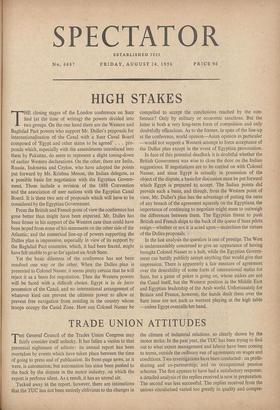HIGH STAKES
THE closing stages of the London conference on Suez find (at the time of writing) the powers divided into two groups. On the one hand there are the Western and Baghdad Pact powers who support Mr. Dulles's proposals for internationalisation of the Canal with a Suez Canal Board composed of 'Egypt and other states to be agreed' . . . pro- posals which, especially with the amendments introduced into them by Pakistan, do seem to represent a slight toning-down of earlier Western declarations. On the other, there are India, Russia, Indonesia and Ceylon, who have adopted the points put forward by Mr. Krishna Menon, the Indian delegate, as a possible basis for negotiation with the Egyptian Govern- ment. These include a revision of the 1888 Convention and the association of user nations with the Egyptian Canal Board. It is these two sets of proposals which will have to be considered by the Egyptian Government.
From the British and French point of view the conference has gone better than might have been expected. Mr. Dulles has been firmer in his support of the Western case than could have been hoped from some of his statements on the other side of the Atlantic; and the numerical line-up of powers supporting the Dulles plan is impressive, especially in view of its support by the Baghdad Pact countries, which, it had been feared, might have felt unable to go so faiagainst an Arab State.
Yet the basic dilemma of the conference has not been resolved one way or the other. When the Dulles plan is presented to Colonel Nasser, it seems pretty certain that he will reject it as a basis for negotiation. Then the Western powers will be faced with a difficult choice. Egypt is in de facto possession of the Canal, and no international arrangement of whatever kind can prevent the ultimate power to allow or prevent free navigation from residing in the country whose troops occupy the Canal Zone. How can Colonel Nasser be compelled to accept the conclusions reached by the con- ference? Only by military or economic sanctions. But the latter is both a very long-term form of compulsion and only doubtfully efficacious. As to the former, in spite of the lime-up at the conference, world opinion—Asian opinion in particular —would not support a Western attempt to force acceptance of the Dulles plan except in the event of Egyptian provocation.
In face of this potential deadlock it is doubtful whether the British Government was wise to close the door on the Indian suggestions. If negotiations are to be carried on with Colonel Nasser, and since Egypt is actually in possession of the object of the dispute, a basis for discussion must be put forward which Egypt is prepared to accept. The Indian points did provide such a basis, and though, from the Western point of view, Mr. Dulles's plan has the advantage of putting the onus of any breach of the agreement squarely on the Egyptians, the importance of continuing to negotiate might seem to outweigh the differences between them. The Egyptian threat to push British and French ships to the back of the queue if Suez pilots resign—whether or not it is acted upon—Underlines the virtues of the Dulles proposals.
In the last analysis the question is one of prestige. The West is understandably concerned to give an appearance of having brought Colonel Nasser to a halt, while the Egyptian Govern- ment can hardly publicly accept anything that would give that impression. There is apparently a fair measure of agreement over the desirability of some form of international status for Suez, but a game of poker is going on, whose stakes are not the Canal itself, but the Western position in the Middle East and Egyptian leadership of the Arab world. Unfortunately for Britain and France, however, the hands dealt them over the Suez issue are not such as warrant playing at the high table —unless Egypt overcalls her hand.


























 Previous page
Previous page